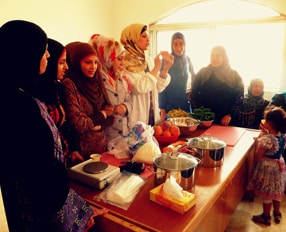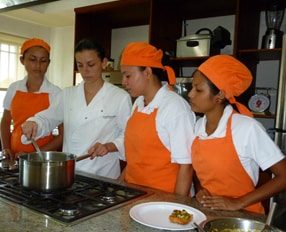The FPSC joined in the celebration of International Women’s Day which takes place on the 8th of March in the entire world, and that is also commemorated at the United Nations.
On the 6th of March, the General Secretariat of the Foundation, Mónica Bohigues, and the Project Director, Macarena Cotelo, attended an event organized by AECID as part of the celebrations, entitled The city as a space of equality of opportunity, a space for dialogue focused on a right to the city, and the full enjoyment and access to its goods and services for women, in an environment free from violence. On this day we were able to learn about different experiences in the field of urban environments that are non-aggressive to women, through projects such as UN Women‘s Global Initiative of Safe Cities, funded by the Spanish Co-operation.
Another event organised as part of the celebration of this day was Women in the Digital Era, attended by the President of the FPSC, Jumana Trad, and the Director of Communication and volunteering, José Luis Zatarain, at the Institute for Women in the Media Lab Prado auditorium, which addressed, among others, the issue of the digital divide between men and women, and was accompanied by the testimony of women from a range of different sectors.
Given that one of the objectives that the FPSC strives for is the training of women in poverty or in high-risk social situations, with these words the FPSC would like to pay tribute to the women who are the real protagonists of the actions resulting from many of its co-operation projects, and to all of their achievements.

One example is the activity that FPSC is developing in the framework of the Agreement “Improvement of water resources management in the agricultural sector to guarantee food safety in the Palestinian Territories and Jordan”, co-financed by AECID (Spanish Agency for International Co-operation), that the FPSC is running specifically in Jordan in collaboration with JOHUD.
With the aim of strengthening the role of women in promoting sustainable development in the rural areas of Jordan and the Occupied Palestinian Territories, training courses are taking place on food security at the household level in towns in rural areas.
Despite the fact that in both Jordan and Palestine, the constitution provides for equal rights between men and women, the reality is that they are in a situation of social marginalization, at several levels: at the level of work, in decision-making and access to natural resources, especially land, and at the level of culture. Palestinian and Jordanian women are often overlooked in their productive and community roles. Laws suppress the inheritance rights of women so that their possibility of access to the land is negligible. The Convention has been working for years to break down these cultural barriers, and to ensure greater empowerment of women.
 Another example of the FPSC projects with a leading role for women is the Project “Empowering of poor rural women of the Department of Carazo, Nicaragua, through the implementation of a technical and vocational training programme oriented on leadership and empowerment”, funded by the Junta de Castilla León.
Another example of the FPSC projects with a leading role for women is the Project “Empowering of poor rural women of the Department of Carazo, Nicaragua, through the implementation of a technical and vocational training programme oriented on leadership and empowerment”, funded by the Junta de Castilla León.
The educational problem in Nicaragua is a determining factor for explaining the low participation of women in rural areas in the economy of their communities. Many of them do not have any specific qualifications. A large percentage do not finish primary school, and there is a high rate of dropping out of school in general. This situation greatly limits women’s chances of finding a good job and improving their income. ACOEN, through the Vega Baja Social Centre in Diriamba (Nicaragua), is working to resolve this phenomenon, providing comprehensive training to women that will allow them to find better paying jobs, thus improving their quality of life and that of their families.
Pictures:















